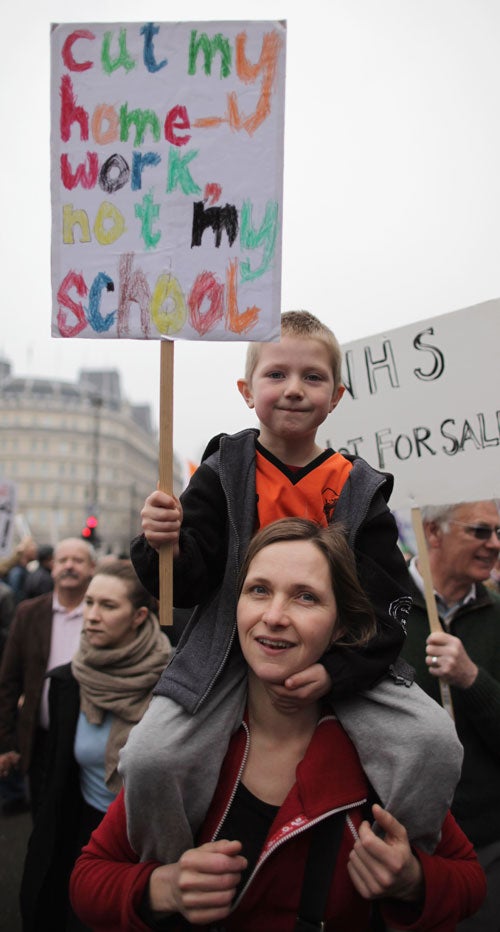Union vows to step up resistance to cuts
PCS warns of wave of co-ordinated strikes this summer

One of Britain's biggest unions is preparing to fund election candidates against mainstream parties to oppose the coalition's cuts. Last night the leader of the Public and Commercial Services Union warned it would escalate "resistance" to the Government's austerity programme, threatening a wave of strikes this summer.
Almost 300,000 members of the PCS will vote this week at their annual conference on a battle plan to step up political, legal and industrial opposition to government attacks on pay, pensions and jobs.
Mark Serwotka, the union's general secretary, told The Independent on Sunday he was ready to mobilise his members who work across the public and private sector, from Whitehall departments to Jobcentres, coastguards, schools and the courts service. Last week the Government announced plans to close 17 benefit processing sites and five contact centres with the loss of 2,400 jobs, sparking fury from the union.
Mr Serwotka now wants to create a "public-sector alliance" between unions to bankroll candidates in council and national by-elections.
"There isn't a political party that argues to oppose all the cuts. We argue there shouldn't be any cuts at all – that actually you should deal with the tax gap, you should invest to grow the economy.
"It is unions that are beginning to lead the political debate in the way Labour should. Labour is not playing its part in this debate. It is all over the place." Unions affiliated to Labour – of which PCS is not one – will try to "shift" the party leftwards, he predicts. "They spend too much time looking respectable and trying to keep everyone happy."
Mr Serwotka also condemned the "ineptitude" of the Tories in government, saying that while he had expected them to use the "economic problems to do things they have probably dreamt of for years", he had been surprised that they have chosen to "go so fast on so many fronts, alienating everybody under the sun". The Liberal Democrats "lied" before the election and have been "disgraceful" since, breaking election promises. "It's good they are really copping the flak."
Using the financial muscle of the unions means a political campaign against the cuts can be conducted on a "much grander scale". Mr Serwotka said the "big stuff" planned included a carte blanche motion at the conference in Brighton for ongoing strikes this summer, from national walk-outs to site-specific stoppages, without further ballots.
He believes that a co-ordinated strike with teachers and lecturers at the end of June will see 750,000 workers take industrial action, with another strike involving up to three million people, including the big unions Unison and Unite, planned for October.
A survey of 2,000 Unison nurses and midwives revealed almost three-quarters are prepared to take industrial action to protect their pensions. The FDA, the union of senior civil servants, also holds its conference this week and will oppose plans to increase pension contributions, while the Fire Brigades Union said cuts were pushing them to "breaking point".
A ComRes/ IoS poll today reveals 48 per cent of people have sympathy for people going on strike against public spending cuts. Mr Serwotka rejects the idea that strikes will be unpopular – but does not care if they are. "You have got to organise the defence of people that are materially losing. Whether someone down the street cares about your job going – they may or may not, but you do. So our primary role has to be to seek to defend the incomes and jobs of those who without them would suffer."
He predicts the impact of mass redundancies in areas heavily reliant on the public sector will lead to a "cycle of despair" and deeper scars than those left by the decline of mining and steel industries in the 1970s and 1980s.
The 48-year-old spent two decades working in benefit offices in south Wales in the 1980s and 1990s. Having worked up from the shop floor, he believes he is better placed to represent his members, and takes a swipe at other unions who "think their activists are dangerous lefties".
Subscribe to Independent Premium to bookmark this article
Want to bookmark your favourite articles and stories to read or reference later? Start your Independent Premium subscription today.

Join our commenting forum
Join thought-provoking conversations, follow other Independent readers and see their replies